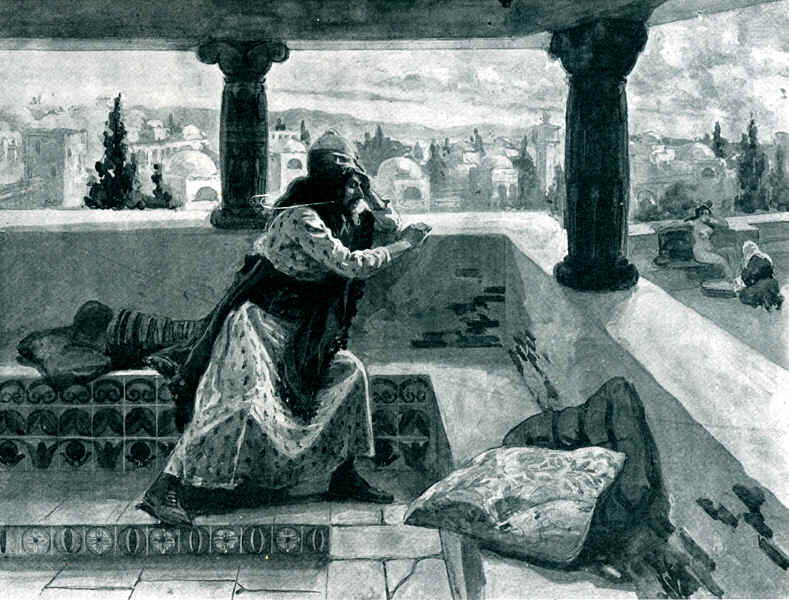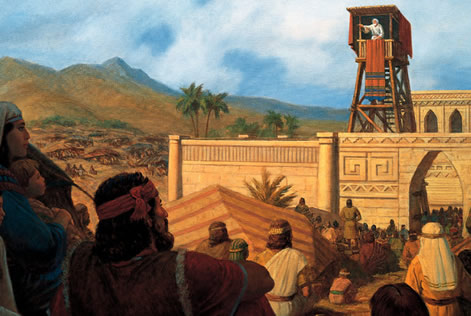The first is the parallel that I see between David's capture of the impregnable fortress of Jerusalem and his own fall. When his armies first approached the walled fortress, they were taunted that even the blind and lame could successfully defend the city. However, the armies of David found a way into the heart of the city through a shaft of their water system and conquered the city, essentially, from within.
Later, ironically, the adversary found a path to David's heart when the conditions were right and succeeded in bringing about the fall of one who appeared a walking fortress of righteousness! By seemingly small initial inroads into his heart, David was brought rapidly to a conclusion of deceit and murder--something previously unthinkable to one who had repeatedly spared the life of Saul when it was "in his hands."
Equally ironic is David's early regard for the women in his life, including his rescue of Abigail and __ from certain horrific harm and his later disregard for Bathsheba's virtue and the resultant suffering of all those women who relied on him for protection and safety.
But the most bitter irony I can now see in this tale is that between the young man who stood face to face with a ten-foot tall giant--armed with the finest equipment, having the best combat training and perhaps having the most formidable collection of combat experiences in the known world at the time--armed only with a sling and some stones with which he slew the giant and his later cowardly murder of Uriah, a faithful servant and soldier.
As is so often the case in our time, the sin of adultery led to the next logical sin in the continuum, murder. Surely, no one in their right mind would do such a thing, but once we willingly step into the power of the adversary, we are certainly no longer in our "right mind!" And the two sins are most definitely linked!
Jeffrey R. Holland, then President of Brigham Young University, had this profound insight in an devotional address:
Setting aside sins against the Holy Ghost for a moment as a special category unto themselves, it is LDS doctrine that sexual transgression is second only to murder in the Lord's list of life's most serious sins. By assigning such rank to a physical appetite so conspicuously evident in all of us, what is God trying to tell us about its place in his plan for all men and women in mortality? I submit to you he is doing precisely that--commenting about the very plan of life itself. Clearly God's greatest concerns regarding mortality are how one gets into this world and how one gets out of it. These two most important issues in our very personal and carefully supervised progress are the two issues that he as our Creator and Father and Guide wishes most to reserve to himself. These are the two matters that he has repeatedly told us he wants us never to take illegally, illicitly, unfaithfully, without sanction.
As for the taking of life, we are generally quite responsible. Most people, it seems to me, readily sense the sanctity of life and as a rule do not run up to friends, put a loaded revolver to their heads, and cavalierly pull the trigger. Furthermore, when there is a click of the hammer rather than an explosion of lead, and a possible tragedy seems to have been averted, no one in such a circumstance would be so stupid as to sigh, "Oh, good. I didn't go all the way."
No, "all the way" or not, the insanity of such action with fatal powder and steel is obvious on the face of it. Such a person running about this campus with an arsenal of loaded handguns or military weaponry aimed at fellow students would be apprehended, prosecuted, and institutionalized if in fact such a lunatic would not himself have been killed in all the pandemonium. After such a fictitious moment of horror on this campus (and you are too young to remember my college years when the sniper wasn't fictitious, killing twelve of his fellow students at the University of Texas), we would undoubtedly sit in our dorms or classrooms with terror on our minds for many months to come, wondering how such a thing could possibly happen--especially here at BYU.
No, fortunately, in the case of how life is taken, I think we seem to be quite responsible. The seriousness of that does not often have to be spelled out, and not many sermons need to be devoted to it.
But in the significance and sanctity of giving life, some of us are not so responsible, and in the larger world swirling around us we find near criminal irresponsibility. What would in the case of taking life bring absolute horror and demand grim justice, in the case of giving life brings dirty jokes and four-letter lyrics and crass carnality on the silver screen, home-owned or downtown.
Is such moral turpitude so wrong? That question has always been asked, usually by the guilty. "Such is the way of an adulterous woman; she eateth, and wipeth her mouth, and saith, I have done no wickedness" (Proverbs 30:20). No murder here. Well, maybe not. But sexual transgression? "He that doeth it destroyeth his own soul." Sounds near fatal to me.
(Jeffrey R. Holland, Of Souls, Symbols and Sacraments, BYU Devotional Address delivered January 12, 1988.)
 While most are able to behave responsibly with the taking of life, there are those-- very many of those-- who, under the power of the same evil spirit that leads them to adultery, are lead to attempt to either cover their sins or to make them convenient by committing murder.
While most are able to behave responsibly with the taking of life, there are those-- very many of those-- who, under the power of the same evil spirit that leads them to adultery, are lead to attempt to either cover their sins or to make them convenient by committing murder.Examine, if you will, the steps David followed as he was being "[lead] carefully down to hell." (2 Nephi 28:21.)
- He was up on his roof. David had a "house of cedar" that was surely one fit for his kingly stature and one that would certainly inspire a great deal of pride in his life's accomplishments--which lead him to such a situation where he could survey his newly captured capital city from his roof top. Pride must have been difficult to resist in such circumstances and, indeed, was an element in the fall of Alma's son, Corianton:
"Now this is what I have against thee; thou didst go on unto boasting in thy strength and thy wisdom.
"And this is not all, my son. Thou didst do that which was grievous unto me; for thou didst forsake the ministry, and did go over into the land of Siron among the borders of the Lamanites, after the harlot Isabel." (Alma 39:2-3.)
But being on the roof--even being proud of his accomplishments was not the demise of David. - He looked where he should not have looked. He had a vantage point to look into what should have been the private chambers of Bathsheba, who was apparently being obedient and faithful to the requirements of the law of Moses and there is no indication that she was in any way seeking to be unfaithful to her husband, Uriah, who was away at war. (Where David likely should have been as well!)
- Upon seeing Bathsheba bathing, he failed to respect her privacy and her honor and virtue by looking away immediately. He noted her appearance and volunteered to lust after her.
- He sent his servants to retrieve her. This would surely have several effects--none of them righteous. He perhaps hoped to impress her with his power and command over the kingdom--maybe even to imply that he could compel her if necessary. It was certainly meant to save him the embarrassment of being seen calling on a married woman himself. Perhaps he hoped to cloak his intentions in the appearance of some "official business" through the gesture. Still, no mortal sin has been committed--recovery is still possible for David.
- Finally, the sin is completed. He commits adultery with Bathsheba, surrenders his will to the adversary and descends into darkness. Nevertheless, he could still repent of even this evil.
- He is notified that Bathsheba is "with child." Surely he would have known this was likely. He watched her ritually bathing indicating the completion of her monthly cycle that would mean pregnancy was likely to occur with his cowardly act. Yet again, he is still in a position to tell the truth, apologize to those he has harmed and offer his support in caring for the life he has carelessly begun (and forfeited through his later actions).
- He becomes desperate to conceal his sins. This brings to mind a relevant warning in our time from the Lord: "...when we undertake to cover our sins, or to gratify our pride, our vain ambition, or to exercise control or dominion or compulsion upon the souls of the children of men, in any degree of unrighteousness, behold, the heavens withdraw themselves; the Spirit of the Lord is grieved; and when it is withdrawn, Amen to the priesthood or the authority of that man." (D&C 121:37.) I personally believe that this was a true turning point. I feel it very likely that it was when his determination became concealment of his crime, he was planting his feet firmly in the territory of the evil one and his desperation grew as faithful and devoted Uriah's refusal to compromise his own integrity drove David into his final act of desperate cowardice. He sends Uriah back to the battlefield with the orders for his own demise in his hands!
To his credit, he realized his sin, but it was too late and his repentance over the remainder of his life insufficient to fully redeem him and his family. The illegitimate child he conceived with Bathsheba died and the rest of his family lived out lives of deceit, intrigue, murder, sexual impurity and brutality in mortality and in the eternities, were "[given] to another." (D&C 132:29.)
David lamentably learned and expressed in his Psalm: "Behold, [the Lord] desirest truth in the inward parts: and in the hidden part [he shall] make me to know wisdom." (Psalm 51:6.) It is truly in our hearts that the most important battles rage, unseen by human eyes. But the effects can last for eternity.
King Benjamin's words seem fitting as closing counsel:
"And finally, I cannot tell you all the things whereby ye may commit sin; for there are divers ways and means, even so many that I cannot number them.
"But this much I can tell you, that if ye do not watch yourselves, and your thoughts, and your words, and your deeds, and observe the commandments of God, and continue in the faith of what ye have heard concerning the coming of our Lord, even unto the end of your lives, ye must perish. And now, O man, remember, and perish not." (Mosiah 4:29-30.)


